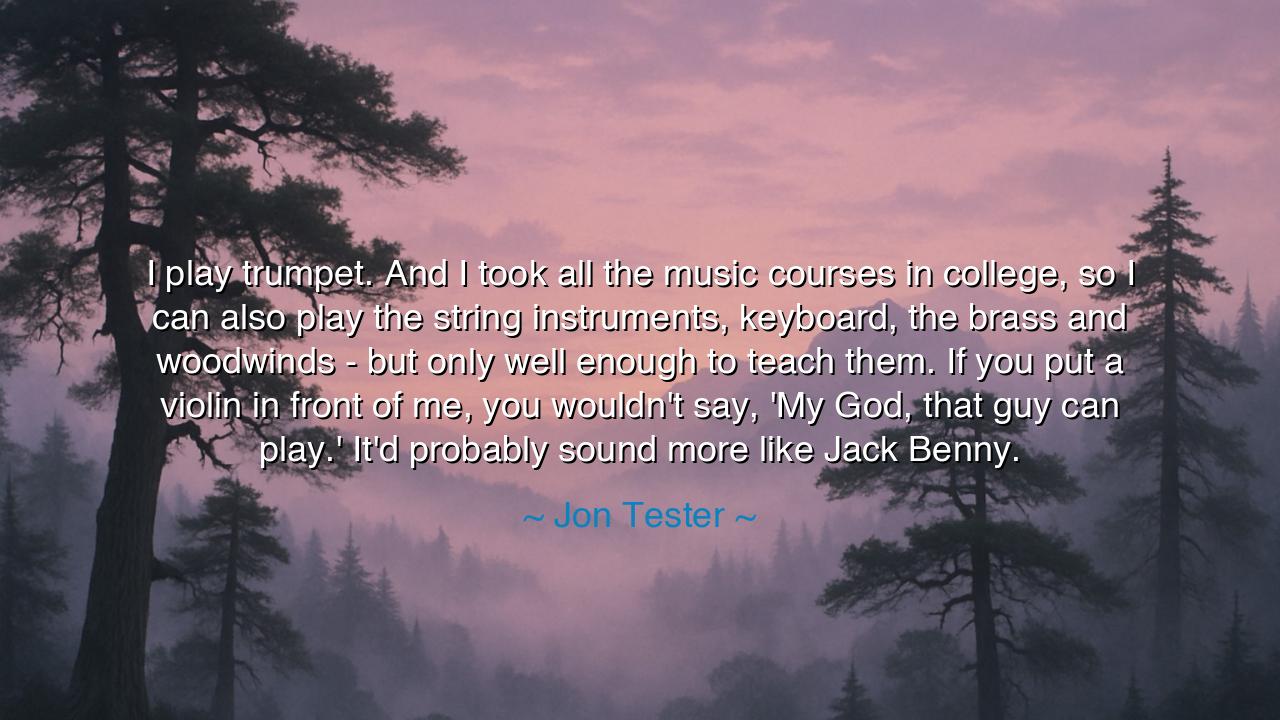
I play trumpet. And I took all the music courses in college, so
I play trumpet. And I took all the music courses in college, so I can also play the string instruments, keyboard, the brass and woodwinds - but only well enough to teach them. If you put a violin in front of me, you wouldn't say, 'My God, that guy can play.' It'd probably sound more like Jack Benny.






When Jon Tester declared, “I play trumpet. And I took all the music courses in college, so I can also play the string instruments, keyboard, the brass and woodwinds—but only well enough to teach them. If you put a violin in front of me, you wouldn’t say, ‘My God, that guy can play.’ It’d probably sound more like Jack Benny,” he was not simply jesting about his musical abilities. Beneath his humor lies a profound teaching: that to master one thing deeply is rare, while to touch many things lightly has its own noble value. He confesses his limits with honesty, yet in this honesty we see the balance between humility and usefulness.
The ancients taught that no man could master every art, for time is brief and human skill finite. Yet they praised those who sought knowledge widely, even if mastery came in only one domain. A philosopher like Aristotle studied politics, biology, and rhetoric, yet was not supreme in all—still, his breadth gave him wisdom. Tester’s words are in this tradition: he is a master of the trumpet, yet his reach extends across other instruments, not to dazzle audiences, but to guide and instruct. This is not weakness, but the quiet strength of the teacher.
Consider the story of Marcus Aurelius, emperor and Stoic. He did not wield the sword as the greatest general, nor speak as the most golden of orators. Yet he learned enough of war, of speech, of law, and of philosophy to rule wisely and to guide Rome. His mastery lay not in being supreme in each craft, but in knowing each enough to lead with insight. Tester’s remark, though spoken in humor, reflects the same principle: one need not be the greatest performer to be of great value. To teach, to share knowledge, even if imperfect, is itself a form of greatness.
Tester’s comparison to Jack Benny, who was famous for comedic “bad” violin playing, reveals his humility. But even here there is wisdom: he admits that performance is not his gift, yet teaching is. Many chase glory in mastery, but forget that the world needs guides, mentors, and those who can pass on the torch of knowledge. Without such teachers, there would be no masters at all. The man who can show a child how to hold the bow or finger a scale is as vital to music as the virtuoso on the stage.
There is also a hidden lesson in balance. Tester reminds us that knowing the limits of one’s ability is not failure—it is clarity. The wise do not pretend to be what they are not; they do not grasp at false crowns. Instead, they honor what they truly know and humbly acknowledge where they fall short. In this humility lies freedom, for it is better to be honest about sounding like Jack Benny than to delude oneself into believing one is Paganini. Such honesty earns trust, both in music and in life.
The lesson for us is clear: seek to cultivate both depth and breadth. Master one thing if you can, for mastery breeds confidence and excellence. Yet also taste of many things, so that you may understand the world more fully and guide others along their path. Do not be ashamed if your skill is modest in some areas—knowledge enough to teach is already a gift to the community.
Practically, this means daring to learn widely, without fear of imperfection. Take up skills you may never master, for they will shape your understanding and make you useful in ways you cannot yet foresee. At the same time, discover what instrument, what craft, what calling is your trumpet—the thing you can truly master—and give it your soul. In this way, you will live as both student and teacher, humble and yet strong, imperfect and yet deeply valuable.
Thus, in Tester’s playful confession lies an ancient wisdom: greatness is not only in mastery, but in the willingness to learn, to share, and to laugh at one’s own shortcomings. For the true harmony of life is not found in perfection, but in honesty, humility, and the courage to keep playing, even if the sound is sometimes rough.






AAdministratorAdministrator
Welcome, honored guests. Please leave a comment, we will respond soon